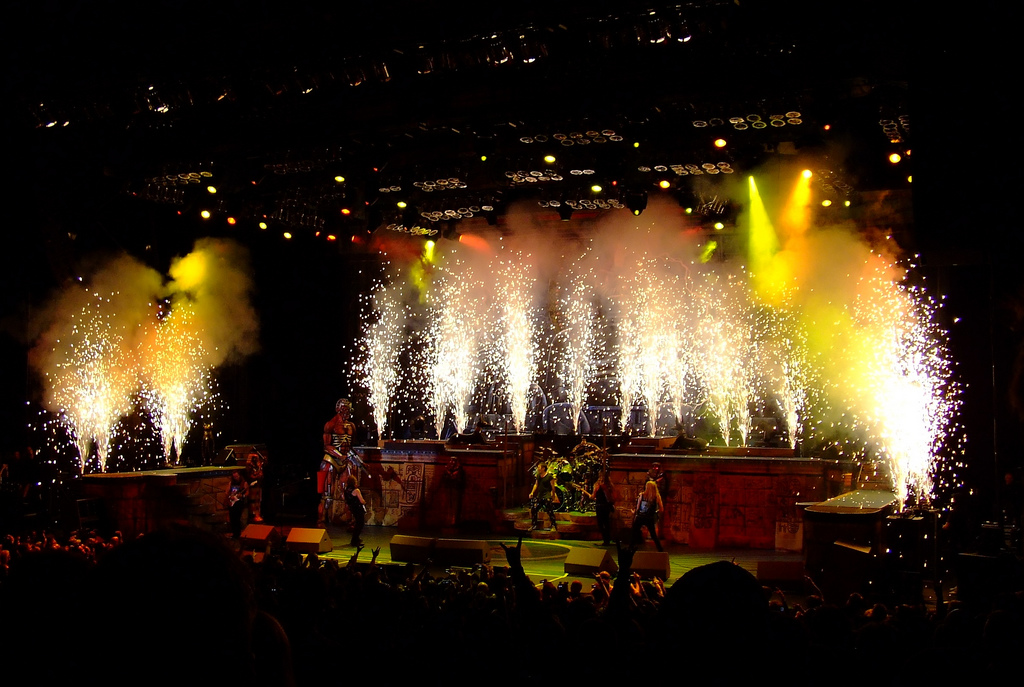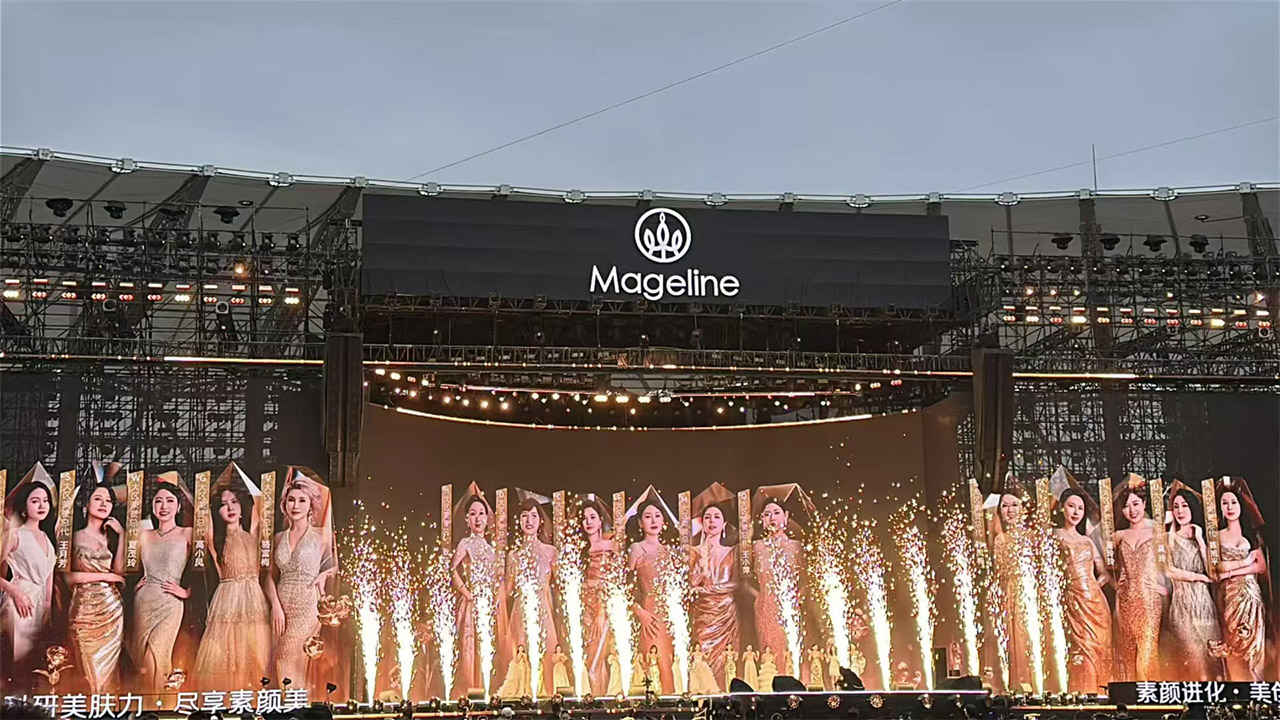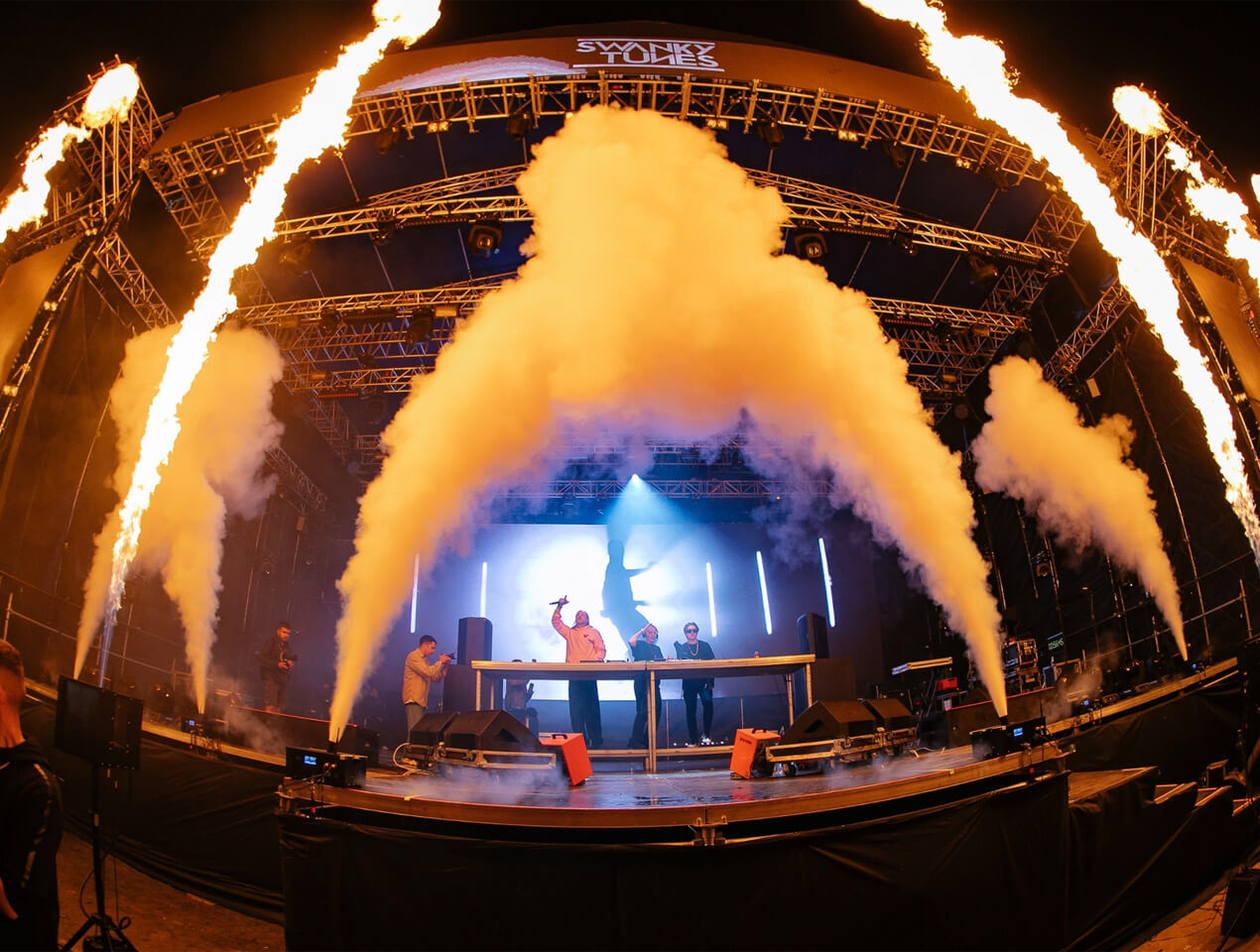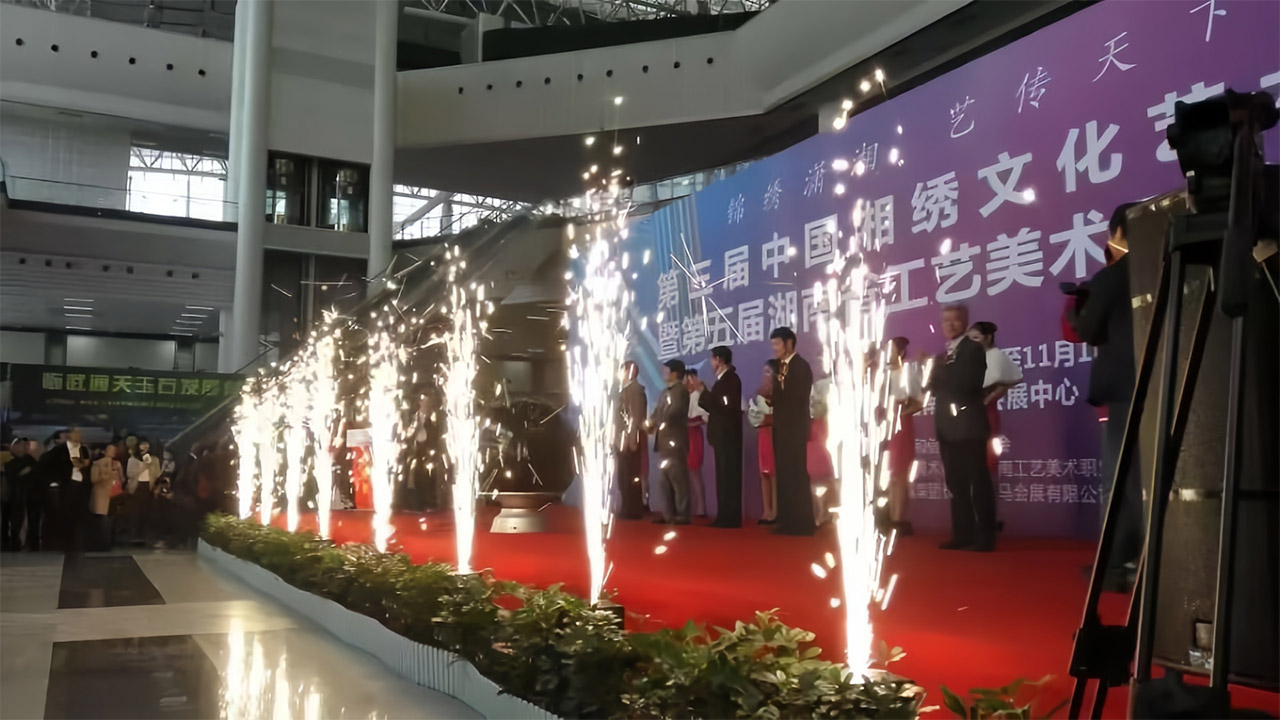Spark Machine Expert Guide – How to Choose the Right Cold Spark Effect Machine
In modern stage productions, weddings, night‑club events and large‑scale outdoor shows, stage effects are key to creating immersive, memorable experiences. Among them, the “Spark Machine” (also known as a cold spark effects machine) has rapidly gained popularity — offering visually stunning spark showers while avoiding many of the risks associated with traditional pyrotechnics.
However, choosing the right device goes far beyond “just how it looks”. It also involves safety, control system compatibility and suitability for the venue. This article acts as an expert guide to help event planners, lighting designers and rental companies select the most appropriate cold spark effect machine for their production.

What is a Spark Machine (Cold Spark Effects Machine)?
A cold spark machine is a specialized device crafted for live events that produces a dazzling fountain or shower of bright metallic sparks, mimicking the look of fireworks but without the large open flame or dense smoke typical of traditional pyro effects.
Definition/Distinction
Unlike conventional fireworks or flame effects—where combustion, high‑temperature flame, and uncontrolled emissions are involved—a cold spark machine uses an electrically‑heated surface or a fan‑blown nozzle to eject particles of specially formulated metallic powders (such as titanium or zirconium‑based granules). These powder particles are ignited at much lower temperatures and propelled upward, creating a controlled shower of sparks with significantly
Common Application Scenarios
These machines are widely used in wedding ceremonies, club nights, concert productions, festivals and many indoor/outdoor event settings where dramatic visual impact is desired but traditional pyro may be restricted.
Key Advantages
-
Safety: Because they do not produce large open flames and generate minimal smoke, they are often suitable for indoor use under properly controlled conditions. This makes them an appealing alternative in venues with strict fire‑codes or low ceiling heights, while still delivering a “spark” moment.
-
Visual Impact: These devices can create spectacular spark showers or jets that integrate with lighting and audio cues to produce a heightened sensory experience. The shimmer of metallic particles, when timed with a light burst or beat drop, can elevate the entire scene and create memorable visuals for photo and video capture.
-
Integration with Production Systems: Many modern models support DMX512 control channels, wireless remote triggers or app‑based interfaces, making them far easier to sync up with lighting rigs, audio cues and overall stage automation schemes. This compatibility allows event production teams to include spark effects as part of their pre‑planned show flow rather than improvising.
Key Factors to Consider When Choosing a Spark Machine for Stage Use

Firing Height & Power Matching
Consider the venue size: indoor vs outdoor, stage height, audience distance. A device with too low a power/output will under‑perform in a large venue; too strong a device in a small space may pose safety and over‑kill issues. Careful matching ensures optimal visual effect and reliable performance.
Control System & Integration Capability
Check if the machine supports DMX512, remote triggering, or app control. Integration with existing stage lighting, audio and automation systems is crucial for seamless performance. Production teams value machines that can be precisely timed and synced with show cues, reducing setup complexity.
Safety Certification & Regulatory Considerations
Ensure that the device has the required certifications (e.g., CE, TÜV) and that you are aware of local regulations: in many jurisdictions, “cold spark” devices may still be classified as pyrotechnics and require permits. Also check safety clearance, audience distance and combustible materials nearby to comply with venue rules.
Machine Construction & Maintainability
Examine build quality, materials (stainless steel housing, sound‑dampening, dust/particle management), ease of servicing, and manufacturer support for parts, training and repair. A rugged reliable machine reduces downtime and maintenance cost, which matters especially for rental companies or frequent use.
Total Cost & Operational Efficiency
Beyond purchase cost consider consumables (metal powder), electricity consumption, installation/transport, maintenance, and whether to purchase vs rent depending on event frequency. Factoring in these operational costs will help you calculate return‑on‑investment and long‑term viability of equipment for your business.
How to Choose the Right Device According to Event Type

Wedding & Private Party
-
Venue type: Usually indoor or semi‑outdoor, audience close to the stage.
-
Recommended spark height: Approx. 1–5 m.
-
Control system: DMX + remote control are preferred for key moments (for example, the bride/groom entrance or the cake‑cutting moment).
-
Safety/environment focus: Opt for low‑temperature spray, high safety margin, minimal smoke, and low noise to suit the intimate atmosphere.
-
Recommended models:
-
600W Hanging Spark Machine with Remote + DMX Control—A compact, hang‑ready model ideal for intimate venues.
-
Nightclub/Club Performance
-
Venue features: Strong lighting, frequent audience‑stage interaction, possibly larger space than a private party.
-
Recommended spark height: Approx. 3–6 m.
-
Control system: DMX512, multiple units networked, rotating nozzles preferable.
-
Safety/environment focus: Device cooling, durability for frequent use, multi‑head jets, integration with lighting/audio.
-
Recommended models:
-
750W Moving Head Spark Machine—360° moving head, DMX control, adjustable output for club scenarios.
-
Large Concert/Outdoor Festival
-
Venue features: High ceilings/trusses, distant audience, many integrated devices.
-
Recommended spark height: Approx. 5–10 m or more.
-
Control system: DMX networked, wireless triggering, outdoor‑rated (weatherproof) design.
-
Safety/environment focus: Rigging safety, audience distance, equipment durability, all‑weather operation.
-
Recommended models:
-
Double Head 1300W Spin Spark Machine DMX+Remote Control—strong dual‑head output, good for large outdoor stages.
-
Event Type vs Device Configuration Guide
| Event Type | Recommended Height | Control System | Safety/Environment Focus | Device Type |
|---|---|---|---|---|
| Wedding / Private | ~1–5 m | Remote + basic DMX | Indoor‑friendly, low smoke, close audience | 600 W entry/hanging models |
| Nightclub/Club | ~3–6 m | DMX512 + rotating head | Strong lights, close audience, frequent use | 700‑800 W mid‑power multi‑head |
| Concert/Outdoor | ~5–10 m or higher | DMX network + wireless trigger | Large space, weather, rigging safety | 1300–1700 W high‑power outdoor |
Pre‑Implementation Preparation & Practical Usage Tips for Spark MachinesSpark

-
-
Venue Measurement & Installation Position
-
Before the event, carefully measure the stage width, height, rigging or mounting point locations, audience distance, and planned installation spots. This precision helps you choose a device with suitable spray parameters for your specific venue. Always mount the unit securely using structural support or rigging hardware. Be sure not to aim spark jets toward spectators, flammable surfaces, or low-obstruction ceilings—maintain sufficient clearance in all directions for safety and regulatory compliance.
-
Control Interface Compatibility & Effect Coordination
-
Verify that the device integrates seamlessly with your lighting console, audio rig, and automation controllers. When control protocols (like DMX512, ArtNet or custom APIs) align, spark effects can trigger exactly in time with show cues and music transitions. To heighten spectacle, layer spark bursts with lighting fades, haze/fog effects, or CO₂ jets, so the visual, atmospheric and audio elements unify in a synchronized, immersive performance.
-
Rehearsal Test & Safety Backup
-
Run a complete technical rehearsal before showtime—test spark height, trajectory, system response delays, and safety buffer zones around the device. Simulate worst‑case timing variances to ensure consistency. Meanwhile, deploy the correct fire suppression equipment (especially Class D extinguishers for metallic powders), ensure trained operators are on hand, and clearly delineate exclusion zones around the effect zone so audiences and crew remain at safe distances during active operation.
-
Operator Training & Cleaning & Maintenance
-
Ensure all operators are fully trained in trigger procedures, emergency stop protocols, safety clearance limits, and proper shutdown sequence to avoid mistakes during live performance. After each use, clean out residual metal dust, inspect nozzles for blockages, and confirm ventilation around the device is unobstructed. According to Siterui’s maintenance guide, for machines equipped with dust nets, these should be cleaned regularly to maintain airflow and prevent overheating.
-
Spare Parts, Total Cost & Operational Efficiency
-
Maintain a strategic inventory of consumables (spark powder or granules) and essential spare parts (nozzles, filters, wiring). Keep servicing and cleaning logs to track usage and spot trends. Weigh the pros and cons of purchase vs. rental, and factor in power consumption, transport and installation costs, and maintenance burden. By considering these logistical and operational costs, you position your system for uninterrupted performance and cost‑effective longevity.
-
Common Misconceptions and How to Avoid Them
-
Misconception 1: “Cold sparks” means no heat or risk.
-
Reality: While cold spark machines produce far less flame and smoke than traditional pyrotechnics, the internal process uses burning metal powders—typically titanium or zirconium—that still generate significant heat and require careful handling.
-
Misconception 2: All models are safe for indoor use by default.
Reality: Some machines emit fine metallic dust, have minimal clearance requirements, or may not suit venues with low ceilings, sensitive décor or ventilation constraints. Matching the model to the venue’s height, proximity to people/objects and air‐circulation is essential.Misconception 3: The cheapest machine will work just as well.
Reality: Entry‑level devices often sacrifice advanced control features, durability, safety certifications and maintenance support. Over time these compromises can lead to increased risk, higher downtime, poor performance or higher operational cost.Tip: Always purchase from a trusted manufacturer, review case studies, ask about service history and compatibility with your production workflow (lighting/DMX, show timing, repeat use). Verify certifications and get documentation so you can operate with confidence.
Conclusion
In summary, selecting the right spark machine for your production is a blend of art and engineering. You must understand the venue size and layout, control system needs, safety/regulatory landscape and operational costs — as well as the visual effect you wish to achieve. By matching the event type (wedding, club, concert) to the appropriate power/output device, you ensure the spark effect delivers maximum impact in the right context. We hope this guide serves as a practical blueprint when choosing your next cold spark effect, and helps you create dazzling moments that align with safety, technical and production requirements.

Top 10 Cold Spark Machines for 2026: A Deep Dive into Performance, Powder Life, and Durability

How to Choose a Snow Machine: The Definitive Checklist to Avoid Costly Mistakes (2026 Guide)

Fog Machines Explained: Technology, Control Systems, and Modern Stage Applications

Haze Machines Explained: The Definitive 2026+ Guide to Effects, Selection & Future Innovations
Recommended for you







Compact and portable, the CO₂ Mini Rainbow Confetti Machine delivers vibrant bursts of rainbow-colored confetti for unforgettable events. Equipped with a manual control option and coming in a sturdy black flight case with wheels, this machine ensures hassle-free transportation and operation. Key features include instant CO₂-powered confetti bursts, adjustable spray intensity, and a leak-proof design. Perfect for stage shows, weddings, and celebrations!

Stay Informed or Connect with Us
Have questions about our latest news or updates?
Reach out to us—we're here to provide more insights or media support.
© 2025 Siterui SFX All Rights Reserved.

 Scan QR Code
Scan QR Code
Whatsapp: +8618922324800
siteruisfx_stage_equipment
Siterui
SITERUI-SFX
STRlighting
@siterui.sfx